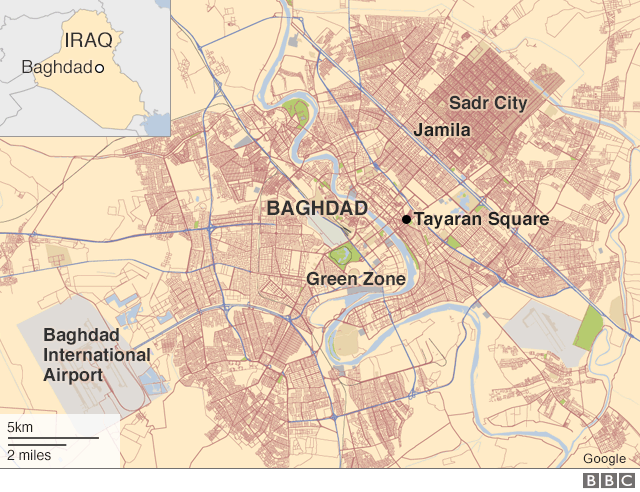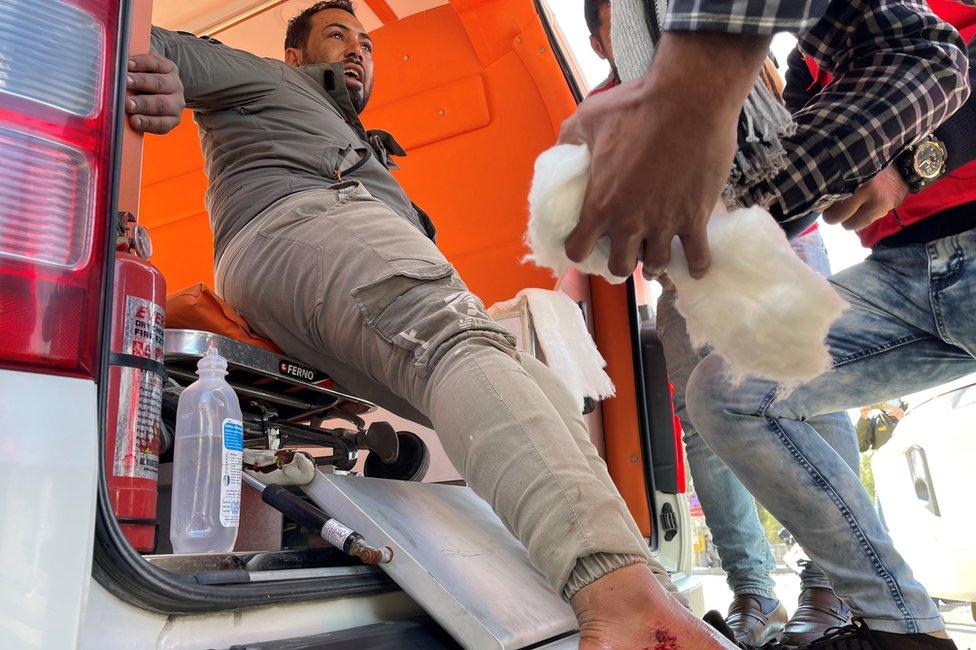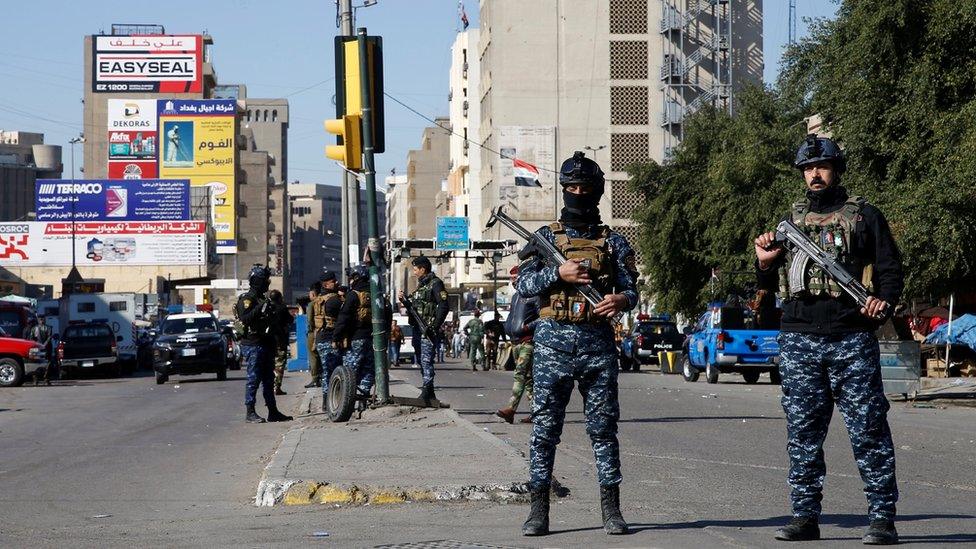Iraq attack: Twin suicide bombings in central Baghdad kill 32
- Published
The two suicide bombers targeted a busy second-hand clothes market
At least 32 people have been killed and 100 others injured in a twin suicide bombing in a busy commercial area in Iraq's capital, Baghdad, officials say.
The bombers blew themselves up among a crowd of shoppers at a second-hand clothes market in Tayaran Square.
The last deadly suicide attack in the city was in January 2018, when 35 people were killed in the same square.
No group has said it carried out the latest attack, but suspicion will fall on the jihadist group Islamic State.
The Iraqi government declared victory in its war against IS at the end of 2017.
However, sleeper cells continue to wage a low-level insurgency in the country, operating mainly in rural areas and targeting security forces.


Iraqi military spokesman Yehia Rasool said Thursday morning's attack was "carried out by two suicide bombers who detonated themselves when pursued by security forces" through the Bab Sharqi area.
But other accounts suggested that the assailants moved freely through Tayaran Square, which was busy following the easing of almost a year of coronavirus-related restrictions.
An interior ministry statement said the first bomber rushed into the market, claiming to feel sick. When people gathered around him he detonated an explosive belt he was wearing.

Ambulances rushed to the scene to take the many wounded to hospitals across Baghdad
"One [bomber] came, fell to the ground and started complaining 'my stomach is hurting' and he pressed the detonator in his hand. It exploded immediately," one stall holder told Reuters news agency. "People were torn to pieces."
The second bomber blew himself up as others came to help the victims, according to the interior ministry. Some reports said that he posed as an injured person.
A video posted on social media purportedly showed the second bomb exploding among a small crowd on a street. Other footage showed bodies strewn across the ground in the aftermath.
The attacks come days after Iraq's government said an early general election would be postponed from June until October in order to give electoral authorities more time to register voters and new parties.
Iraqi President Barham Saleh said the targeting of innocent people in Baghdad "at this specific time confirms the attempt by the groups of darkness to target all national entitlements and our people's aspirations for a safe future".
Pope Francis, who plans to visit Iraq in March, sent a message to Mr Saleh "deploring this senseless act of brutality".
The UN mission in Iraq also strongly condemned the attacks. "Such a despicable act will not weaken Iraq's march towards stability and prosperity," a statement said.
Allow X content?
This article contains content provided by X. We ask for your permission before anything is loaded, as they may be using cookies and other technologies. You may want to read X’s cookie policy, external and privacy policy, external before accepting. To view this content choose ‘accept and continue’.

Ali al-Bayati, a member of the Iraqi High Commission for Human Rights, tweeted that the bombings were an "indicator of the return of terrorism" and "the weakness of security institutions".
The attacks were not immediately claimed, but Civil Defence chief Maj Gen Kadhim Salman said: "[IS] terrorist groups might be standing behind" them.
Suicide bombings have become rare in the capital since the military defeat of IS by Iraqi security forces, who were supported by a US-led multinational coalition and Iran-backed paramilitary forces.
IS once controlled 88,000 sq km (34,000 sq miles) of territory stretching from eastern Iraq to western Syria and imposed its brutal rule on almost eight million people.

The Iraqi military said security forces had been pursuing the suicide bombers before the blasts
A report by the UN secretary general released last August estimated that more than 10,000 IS fighters remained active in Iraq and Syria, external.
The fighters, organised in small cells, were moving freely across the border between the two countries and some had managed to find safe haven in the Hamrin mountains of north-eastern Iraq, from where they were carrying out a "war of attrition" against Iraqi security forces, it said.
US-led coalition forces in Iraq reported in October that IS was relying mainly on improvised explosive devices (IEDs) and small-arms fire in its attacks, external. Most were recorded in the northern provinces of Diyala, Salahuddin, Kirkuk and Nineveh, and in the western province of Anbar, it said.
Last year, then US President Donald Trump ordered the withdrawal of half the American troops deployed in Iraq, saying he had confidence in the ability of local forces to prevent a resurgence of IS. The US presence was cut from 5,200 to 3,000 in September, and was due to fall to 2,500 this month.